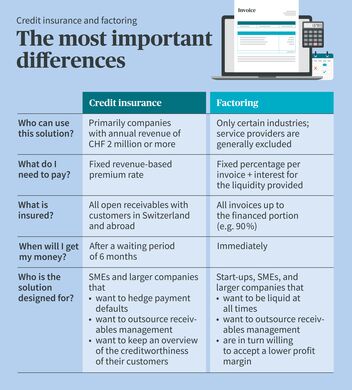
Avoiding default: How to protect your liquidity
In order to avoid payment defaults, it is important for companies to insure themselves in good time. We give you tips on how to prevent payment defaults and insure against major financial risks so that you can sleep peacefully even if you have larger invoices.
No one likes talking about unpaid bills. SMEs repeatedly experience payment defaults, even if most invoices are paid on time. No company wants to put its business partners in a tight spot, but measures must be taken to prevent defaults. This is because there is the ever-present risk that goods which have already been delivered or services that have already been provided will never be paid for. And it has been exacerbated by the economic difficulties of the last two to three years.
We’ve talked to the experts and some companies so we can show you how they mitigate default risks and how you can set up an efficient receivables management system.
Risky leveraging: from default to bankruptcy
Customers that don't pay can quickly put start-ups and SMEs in a tricky situation. But when is an account considered in default?
What is default?
Default is when an agreed payment is not paid, and due to the insolvency of the debtor, it can no longer be collected.
Paolo Larentis, Head of Sales of Credit & Surety at AXA knows only too well: “In economically uncertain times in particular, the insolvency of your most important customer can also have far-reaching consequences for your business. Every third bankruptcy is due to a domino effect.”
Suppliers and customers are third-class creditors under the law, and as such have to wait in line when it comes to entitlement to a company's bankruptcy assets. The claims of employees and the OASI are ranked higher, for example. The horrible part is the enormous leveraging effect: With an assumed net margin of ten percent, ten times more profit must be made in order to offset solely the loss arising from the defaulted payment. If you have to shoulder CHF 10,000 in lost profit, then you need to make CHF 100,000 more in sales to offset this loss. And of course here, too, there is the risk of default. For this reason, suitable measures such as credit checks, reminders and dunning procedures are essential in order to minimize the risk.
5 measures against default
This makes it all the more important to prevent delinquency early so it won’t escalate into a risky situation. You can take the five steps below to protect your company from default:
- Written documentation
In order to avoid payment defaults, it is important to document all business transactions in writing. This is the only way you can prove, if necessary, that the data on the products or services provided are correct. By recording everything in writing, you create a solid basis for being prepared in the event of payment defaults. - Make immediate payments attractive
Try to increase your percentage of immediate payments. You can do this mainly by offering payment options or discounts for immediate payments. - Run credit checks and record payment history
Conducting a credit check before the contract is signed is an important measure to prevent payment defaults. Set up customer profiles that include entries for payment history. Based on the credit check and customer profiles, you can quickly take effective and, above all, targeted measures in the event of problems. - Set up receivables management
In order to optimize receivables management, it is crucial to establish a structured dunning system. As a first step, reminders should be sent at regular intervals to collect overdue payments. It’s important to proceed consistently and not be afraid to take legal action as a last step if customers fail to pay despite repeated reminders. - Let go of customers who make no improvement
Instead of engaging in lengthy dunning procedures, you should consider parting with uncooperative customers if their payments are delayed several times or for particularly long periods.
Receivables management: What should I do if a payment is late?
To prevent defaults, effective receivables management is essential for every company. Even after a credit check and payment has been made, customers can still be in arrears. If a client does not pay their bill, you should take immediate action. The quicker you react, the more likely you are to get paid. Here’s what your receivables management could look like:
- Payment reminder: Make a friendly request or send a payment reminder. Base your tone on how you normally communicate with this client. Maybe give them a call? This makes the connection more personal and it’s really quick.
- Dunning process: If following up and sending reminders yield no results, then the next step is to send a debt collection letter (don’t forget to add on the fee for this). Depending on how long you want to or can afford to wait and how close your ties are to the client, you can send one or two debt collection letters. Remember to define clear payment dates in all written reminders and payment requests in order to leave no room for interpretation and to strengthen your legal basis. One typical and effective measure to use in the debt collection process is to stop delivery of goods or services until you receive the outstanding payment.
When should I send a debt collection letter?
Regardless of whether you're dealing with a private person or a company, from a purely legal standpoint, you only have to send debt collection letters to customers if there is no concrete payment date on the invoice, but rather a time limit (e.g. “within 30 days from receipt of the invoice”). If a specific deadline is given (e.g. “Payment due by 02/26/23”), then the person or business is in default after this date even without a debt collection letter. In order to keep up good customer relations, we would suggest you send a reminder letter even in this case instead of resorting directly to debt collection measures. Incidentally, a 30-day payment deadline is not prescribed by law. You can also set a deadline of ten days, for example. If your company has enough liquidity to manage, you can also set yourself apart from your competitors by setting a longer deadline.
If you have sent the customer (several) letters but have not yet been paid, there are two more options left:
3. a) Debt collection: You can take your case to the debt collection office in order to initiate proceedings against the debtor. If the outstanding invoices are not paid after a payment summons has been sent or no objection has been filed, then you can take legal steps: An arbitration process and/or court proceedings will be initiated.
Note: If the delinquent person or company is located outside of Switzerland, then court proceedings can be more complicated because they will be held at the foreign court that has jurisdiction. In this case, you should definitely seek legal advice right away in order to avoid extensive fees.
3. b) Debt collection proceedings: You hire a debt collection agency to collect on the debt for you. They will start debt collection proceedings against the delinquent person or company. If this does not resolve the issue, then they will take legal steps after consulting with you. The only difference between this situation and Step 3a is that here you are outsourcing the process to an external service provider.
Tip: Make sure to clearly define the payment date in any letters you send so there can be no room for misinterpretation.
How can I secure my liquidity as a start-up or SME?
As a start-up or SME, it is crucial to safeguard liquidity and avoid payment defaults. You could protect yourself against payment defaults by taking out special insurance or using factoring. Business owners can sleep well at night knowing they have this added level of security, which is all the more important during times of crises. Here are two options you can use to keep your company safe from defaults:
Trade credit insurance – maximum protection against defaults
If you want to secure all your unpaid invoices rather than just individual invoices, then trade credit insurance is a good option for you. It is especially worthwhile if many of your clients are located (further) abroad or they have subsidiaries based there.
Another advantage is higher credit ratings
Companies that have secured their outstanding receivables through an insurance policy are rated higher. This generally garners you more attractive conditions on loans.
Some of the benefits of trade credit insurance are:
- Guaranteed indemnification for delinquent payments by the invoice deadline
- Settlement of receivables management
- Credit checks for new clients and credit monitoring of existing customers
Factoring – conveniently delegate your receivables management
Factoring is ideal if you don’t want to mess with collecting unpaid bills. You can outsource this task to a factoring company that will immediately pay the amount owed you (generally with a 10% deduction), in return for a fee for their services. The factoring company then takes over the debt collection process with the end client.
Note: Some companies may require you to repay the amount they paid you if they are not able to collect the debt. For this reason, you should check the terms of the agreement before choosing a factoring company.
Factoring makes the most sense if your clients are in good financial standing, your company is financially healthy and you are interested in outsourcing this administrative task.
Trade credit insurance or factoring – which one is right for my company?
The best way for your company to avoid delinquent debt depends on various factors. Our overview gives you the relevant aspects.

Hedge the risk for delinquent payments
Companies are becoming less and less inclined to bear the risk for delinquent debts themselves. Nor are they interested in doing the work involved in checking credit ratings and managing receivables. Two AXA clients tell us how insurance has helped them in concrete terms in their day-to-day business.
No worrying about unpaid invoices, no hassling with debt collection
“In the past two years, we’ve had many more customers who lack the liquidity to pay their bills,” relates Pascal Fellay, CFO of Cremo SA. The second-largest milk processing company in Switzerland supplies retailers as well as hotels and restaurants.
Cremo SA has had a trade credit policy for over 20 years. The policy takes over debt collection when the invoice remains unpaid after the due date. The insurance courteously asks the client to pay the outstanding invoice. If necessary, it will then begin debt collection proceedings. If the proceedings go forward, the insurance will represent the legal interests of the company. Pascal Fellay is pleased with this service, “For us, it is a very practical solution because we can just hand over the entire case.”
The company decides at what point debt collection should be brought against the delinquent client. If non-payment is unavoidable, then AXA trade credit insurance will cover the unpaid invoice. “It is not possible for us to take on this risk. If a key partner takes bankruptcy, it could jeopardize our company,” states the CFO.
In the past two years, we’ve had significantly more customers who lack the liquidity to pay their bills.
Cremo SA
The second-largest milk processing company in Switzerland processes milk from western Switzerland and the canton of Bern to make products such as butter, cheese, cream, yogurt or milk powder. Headquartered in Villars-sur-Glâne, the company has some 800 employees and has been a stock corporation since 1927, but is not publicly listed.
Maintaining an overview of your main clients’ solvency
Not only does trade credit insurance come into play when difficulties are first encountered. It also has a preventive effect. The insurance company continually monitors the credit rating of the customer base, which saves companies a lot of time. “If AXA lowers the credit rating of a company, this serves as a warning for us and we can take appropriate action. If it raises the credit rating, then this gives us peace of mind, so we can sleep soundly at night,” explains Pascal Fellay.
Roland Schwyter, Backoffice Head at PVA AG agrees. The company sells flooring, doors and wood-based products and has also had a trade credit policy for some time. “We learn early on if one of our business partners is having financial difficulties. This has helped us out quite often.” The volume of their clients exceeds their ability to keep an overview, which is why the service is especially valuable for them. “Without trade credit insurance, the cost of our receivables management would be considerably higher,” says Roland Schwyter.

PVA AG has seen some surprising defaults, notes Roland Schwyter, Backoffice Head.
Despite credit monitoring, PVA AG has seen some defaults, notes Roland Schwyter. Once a carpenter who had always paid his bills suddenly went under. “That was a complete surprise that came without warning.” Thanks to trade credit insurance, PVA AG came out fine. “We are lucky to have a lot of reliable customers. But as everywhere, there are exceptions.” For that reason, it is not possible for them to take on this risk themselves. When building and renovating houses, they often have a great deal of capital tied up, which PVA AG is not willing or able to put at risk.
PVA AG
The family-owned company headquartered in Altendorf in the canton of Schwyz sells flooring, doors and wood-based products and supplies woodworking commercial businesses in the greater Zurich area, in central and eastern Switzerland as well as retailers throughout the country. Since it was founded in 1954, PVA AG has grown into an innovative SME, employing around 80 people together with its subsidiary GUIGNARD Parkett AG.








